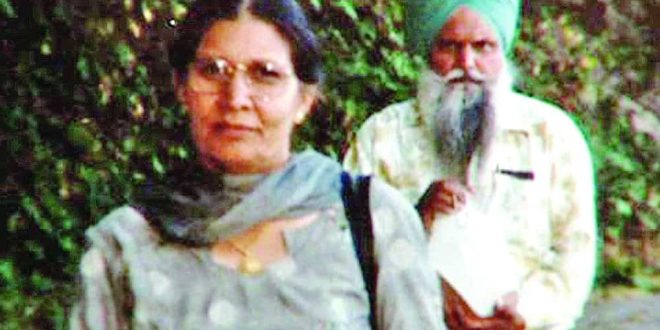THE B.C. Court of Appeal this week dismissed the applications of slain Maple Ridge woman Jaswinder (Jassi) Kaur Sidhu’s mother Malkit Kaur Sidhu and uncle Surjit Singh Badesha for a judicial review of Justice Minister Jody Wilson-Raybould’s September 28, 2017 order for their extradition to India to face charges in connection with the murder of Jassi Sidhu.
The two were seeking a stay of extradition proceedings for abuse of process due to their attempted surrender to India without an opportunity to seek a judicial review of the minister’s decisions on whether to accept their new submissions. They were also seeking a judicial review of the minister’s decisions.
The court said that although the minister’s conduct amounted to an abuse of process, it did not warrant a stay of proceedings in the circumstances of this case and that the minister acted reasonably in refusing to accept the applicants’ submissions.

On June 8, 2000, Jassi Sidhu, 25, a resident of Maple Ridge was brutally murdered in Punjab, India. Her husband Sukwinder (Mithu) Singh Sidhu, a poor rickshaw driver, was also seriously injured in the attack carried out by contract killers who were allegedly hired by his wife’s mother Malkit Sidhu and uncle Surjit Badesha in B.C.
Last January, The VOICE had reported that Vancouver defence lawyer Michael Klein told this newspaper that the lawyers for Malkit Sidhu and Badesha were seeking disclosure about any documentation that will disclose to them why and how their clients were removed from their jails to be presumably sent on their way to India. Klein said this was to advance an argument made earlier last year that there was an abuse of process and that the extradition surrender should be stayed.
The court noted that under the Extradition Act the minister had an obligation to consider the late submissions, but no obligation to accept them. It also pointed out that “the submissions repeated or were largely duplicative of submissions made to the Minister in 2014 and they did not undermine the reliability of India’s assurances.”
It also said that the affidavits were variably dated, weak, unreliable, lacking in specificity, and marginally relevant.
The court noted “that the applicants made no attempt to put their “new” evidence before the Supreme Court of Canada in 2017, or this Court in 2015, or to bring it to the attention of either Court and seek directions when the surrender issue was under consideration by the courts … indicates a strategic decision to further delay extradition.”
It said that “there is a need for the extradition process to proceed expeditiously and for finality in extradition proceedings; and the applicants are charged with the most serious crimes and have had the opportunity to challenge their extradition over a seven-year period: their submissions implicating India’s prison system have been considered by two Ministers of Justice, this Court and the Supreme Court of Canada.”
Detailed Background: The Crime
(From the court ruling)
On June 8, 2000, Jaswinder Kaur Sidhu and her husband, Sukhwinder Singh Sidhu, were travelling by scooter in the Punjab region in India when they were attacked by a group of armed men. Sukhwinder was seriously injured in the assault. The assailants forced Jaswinder into a car and drove away. The next day, Jaswinder’s body was discovered on the bank of a canal in a village close to where the attack had taken place. Her throat had been cut.
Almost a year earlier, the couple had married in India without the knowledge of Jaswinder’s family. Jaswinder’s family was from a high socio-economic class. Her husband was from a low socio-economic class: he was a rickshaw driver from a poor family. It is alleged by the Indian government that Mr. Badesha and Ms. Sidhu strongly opposed the marriage of Jaswinder and Sukhwinder, took steps to try to end it, and when those efforts failed, arranged for a number of persons in India to attack and kill the couple.
Thirteen people, including Mr. Badesha and Ms. Sidhu, were charged in India in connection with the killing of Jaswinder and the attack on Sukhwinder. Eleven of those charged were tried together in India. Seven were convicted and four were acquitted of offences arising out of the attack, including murder, attempted murder, and conspiracy to commit murder. Four of the seven who were convicted were later acquitted on appeal. Mr. Badesha and Ms. Sidhu are the only accused persons who remain to be tried in this matter.
By a diplomatic note, India sought their extradition for the offence of conspiracy to commit murder under the Indian Penal Code: the Extradition Treaty between the Government of Canada and the Government of India, Can. T.S. 1987 No. 14. The Minister of Justice issued an Authority to Proceed, authorizing extradition proceedings against Mr. Badesha and Ms. Sidhu on the corresponding Canadian offences of conspiracy to commit murder, attempt to commit murder and murder.
The extradition judge found that there was a substantial body of circumstantial evidence implicating Mr. Badesha and Ms. Sidhu in the alleged crime, including evidence that: they viewed the marriage between Jaswinder and Sukhwinder as bringing dishonour to their family; they issued death threats to Jaswinder and Sukhwinder; and phone calls were placed from Mr. Badesha’s home phone in British Columbia to some of the Indian perpetrators around the time the couple was attacked. The extradition judge concluded that on this evidence, a reasonable jury, properly instructed, could find that Mr. Badesha and Ms. Sidhu hired the Indian perpetrators to kill Jaswinder. Accordingly, he committed Mr. Badesha and Ms. Sidhu on charges of conspiracy to commit murder and murder.
 Desi Today Magazine
Desi Today Magazine




